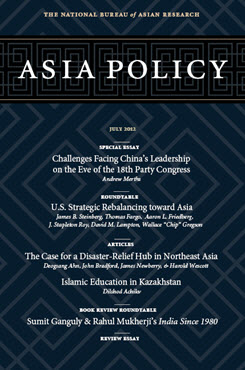Domestic Institutional Challenges Facing China's Leadership on the Eve of the 18th Party Congress
China’s institutional weaknesses, often misperceived as strengths, provide the principal challenges to the new, fifth-generation leadership and its ability to execute its policy preferences and meet the growing complexity of state and societal expectations.
EXECUTIVE SUMMARY
MAIN ARGUMENT
Casual observers of China often interpret unexpected Chinese domestic and foreign policy behavior as a sign of China’s growing strength. But oftentimes the opposite is the case: such behavior is symptomatic of state weakness in the face of growing and increasingly complex demands. As China convenes its 18th Party Congress and the fifth generation of leaders led by Xi Jinping takes the helm, China faces a number of difficult challenges on multiple fronts. Although these issues can have far-reaching international implications, they are domestic in nature and require China’s leaders to adapt state institutions to growing demands from a diverse collection of actors within the state and in society. These challenges include the economic and political restructuring of center-local relations; management of military command and control; the creation of channels to satisfy societal expectations, particularly among the post-1989 generation; and a solution to the escalating crisis in Tibet.
POLICY IMPLICATIONS
- To establish realistic expectations of Chinese capabilities, policymakers should understand and appreciate the degree to which economics and politics have become fused in China.
- Policymakers should make it difficult for China (or the United States) to terminate military-to-military relations so that both states can engage in a long-term professional and mutually beneficial dialogue at pre-1989 levels.
- The West should avoid becoming an easy target for a negative variant of Chinese nationalism among the younger demographic by understanding and appreciating the breadth, depth, and dynamism of the Internet in China, instead of focusing on censorship and the “great firewall,” which are easily subverted by users in China.
- The acute Tibet issue differs now from the chronic problems of the past, and resolution of it is imperative for regional stability. A Chinese occupation scenario in Tibet after the passing of the fourteenth Dalai Lama will resemble a situation more akin to contemporary Afghanistan than, for example, postwar Japan.
Asia Policy 14 is supported in part by a grant from the Ford Foundation.
About Asia Policy
Asia Policy is a peer-reviewed scholarly journal presenting policy-relevant academic research on the Asia-Pacific that draws clear and concise conclusions useful to today’s policymakers. Asia Policy is published quarterly in January, April, July, and October and accepts submissions on a rolling basis. Learn more


